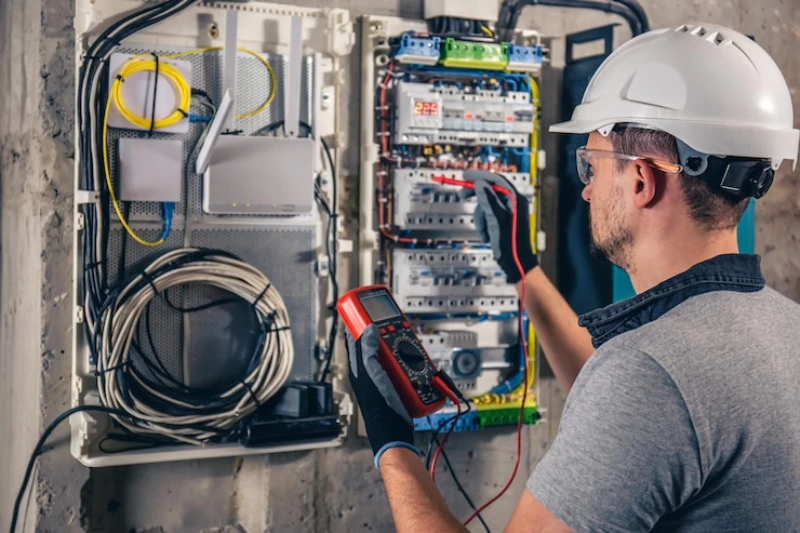Electricity is the foundation of our modern society, powering everything from our houses to our businesses. At the heart of this critical infrastructure are experienced electricians who labor relentlessly to install, maintain, and repair electrical systems. Journeyman electricians play an important part in this industry.
A journeyman electrician is a highly trained individual who has finished a rigorous apprenticeship program and has the ability to operate independently. If you are searching for some journeyman to solve your electricity problem, you should go for expert companies.
What is a journeyman electrician? How are they different from their apprentice and master counterparts? Let’s discuss all these.
The Path to Journeyman Status
The road to becoming a journeyman electrician begins with a fundamental education. Aspiring electricians typically enroll in a technical or vocational training program, where they learn the basic principles of electrical theory and safety.
From there, the real hands-on learning begins. Electricians-in-training must complete a rigorous apprenticeship program, which usually lasts around 4 years and requires 8,000 hours of on-the-job experience. During this time, they work under the guidance of experienced journeyman and master electricians like Sagan Electric, learning how to:
- Interpret blueprints and mechanical drawings
- Install and maintain electrical equipment and power supplies
- Adhere to electrical codes and safety regulations
- Understand fire alarm systems
- Properly ground, bond, and utilize protective devices
This extensive training is essential for journeymen, as they will be responsible for performing a wide range of electrical tasks on their own.
Once the apprenticeship is complete, aspiring journeymen must pass a licensing exam in their state to demonstrate their proficiency. This exam covers both theoretical knowledge and practical skills, ensuring that journeymen are prepared to work safely and effectively.
The Responsibilities of a Journeyman Electrician
With their extensive training and licensing, journeyman electricians are well-equipped to handle a variety of electrical tasks. Their primary responsibilities include:
Inspecting and Servicing Electrical Systems
Journeymen are responsible for thoroughly inspecting electrical wiring and equipment to ensure everything is functioning properly and up to code. This may involve servicing outdoor power lines and poles, as well as diagnosing and repairing any issues within a building’s electrical system.
Installing New Components
From circuit breakers and switches to lights, appliances, and security systems, journeymen electricians are skilled in the installation of a wide range of electrical components. They rely on their knowledge of blueprints and electrical schematics to ensure everything is properly wired and connected.
Mentoring Apprentices
Journeymen often take on a mentorship role, supervising and training aspiring electricians who are working through their apprenticeship programs. They provide hands-on guidance, share their expertise, and help the next generation of electricians develop the skills they need to succeed.
Maintaining Records and Ordering Supplies
In addition to their hands-on electrical work, journeymen are also responsible for maintaining detailed records of their labor and materials used. They must also stay on top of inventory, ordering new parts and supplies as needed to keep projects moving forward.
Providing Estimates and Communicating with Customers
As skilled professionals, journeymen are often tasked with evaluating electrical issues and providing customers with accurate estimates for the work required. They must also effectively communicate with building owners, general contractors, and other stakeholders to ensure everyone is on the same page.
Specializations Within the Journeyman Role
While all journeyman electricians share a common base of knowledge and skills, many choose to specialize in one of two distinct areas:
Outside Linemen
Journeyman lineman are experts in outdoor electricity, focusing on the power grid and distribution infrastructure. They work on power lines, utility poles, and other equipment that delivers electricity to homes and businesses.
Inside Wireman
Inside wireman, on the other hand, specialize in supplying power within the confines of a building. They handle the installation and maintenance of electrical wiring, outlets, light fixtures, and other components that bring power to the interior of a structure.
Both specializations require highly technical skills, and journeymen in these roles must be adept at reading blueprints, troubleshooting issues, and ensuring compliance with all relevant codes and regulations.
The Path to Master Electrician
While journeyman electricians are highly skilled and capable, there is an even more advanced role in the industry: the master electrician.
Master electricians have extensive additional training, typically requiring 4,000 hours of work experience over the course of 1-3 years beyond the journeyman level. They must also pass a rigorous exam to demonstrate their mastery of electrical concepts and project management.
The key differences between journeyman and master electricians include:
- Master electricians can design electrical blueprints and building plans, while journeymen primarily interpret existing schematics.
- Masters are often responsible for overseeing complex electrical projects, coordinating with general contractors, architects, and other tradespeople.
- Masters have the authority to obtain permits, ensure compliance with building codes, and serve as the primary point of contact for project owners and vendors.
- Masters can also choose to start their own electrical contracting businesses, leveraging their advanced skills and knowledge to become entrepreneurs.
Becoming a master electrician is a significant achievement, and those who attain this level of expertise are highly sought-after in the industry. The additional training and responsibilities translate to higher earning potential as well, with master electricians earning an average of around $75,000 per year, compared to $65,000 for journeymen.
The Importance of Journeyman Electricians
Journeyman electricians play a vital role in keeping our homes, businesses, and communities powered and running smoothly. Their extensive training and hands-on skills make them essential for a wide range of electrical tasks, from performing routine maintenance to troubleshooting complex system failures.
As the backbone of the electrical industry, journeymen are responsible for:
- Ensuring the safety and reliability of electrical infrastructure
- Implementing the latest industry codes and best practices
- Passing on their knowledge and expertise to the next generation of electricians
- Providing high-quality, professional services to customers
Conclusion
The journeymans are highly trained individuals who have a unique combination of technical expertise, problem solving abilities, and hands-on experience, making them valuable members of the electric sector.
Journeyman electricians, whether they specialize in outside linework or interior wiring, are the backbone of our electrical infrastructure, ensuring that power is delivered consistently and safely to homes, companies and communities across the country.











